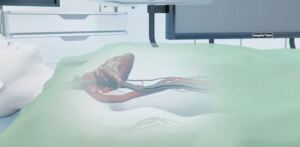by
Nancy Ryerson, Staff Writer | August 20, 2013

The catheter in the body.
A new device uses GPS-like technology, minus the annoying voice, to guide catheters during tricky heart procedures. The MediGuide Enabled ablation catheters manufactured by St. Jude Medical, FDA-approved Aug. 15, use the technology to treat irregular heartbeats without the volume of radiation used in traditional treatments.
Cardiac ablation normally treats atrial flutter, a heart rhythm disorder where the upper heart chambers beat too fast and out of sync with the lower heart chambers, by using X-ray or fluoroscopy while the abnormal tissue is burned away.
The new device allows doctors to guide catheters through the procedure while using 50 to 90 percent less radiation.



Ad Statistics
Times Displayed: 66192
Times Visited: 2165 Ampronix, a Top Master Distributor for Sony Medical, provides Sales, Service & Exchanges for Sony Surgical Displays, Printers, & More. Rely on Us for Expert Support Tailored to Your Needs. Email info@ampronix.com or Call 949-273-8000 for Premier Pricing.
The catheter is equipped with a special magnet and can be steered in two different directions, unlike other catheters. The system uses other magnets triangulating around the body to determine where the catheter is moving along a pre-recorded X-ray.
"Most physicians are trained to look at X-rays, so we wanted to get one X-ray that can be a road map," Srijoy Mahapatra, vice president of clinical, medical and scientific affairs at St. Jude Medical, told DOTmed News. "Now when the catheter moves, it's tracked on the screen."
Mahapatra said that when the technology was used in the Europe, it reduced radiation exposure by 50 to 90 percent.
"Since radiation is associated with the risk of cancer and other problems for both the patient and doctor and staff, the more you get, the worse it is," says Mahapatra. "Now we can move the catheter with GPS-like technology instead."

